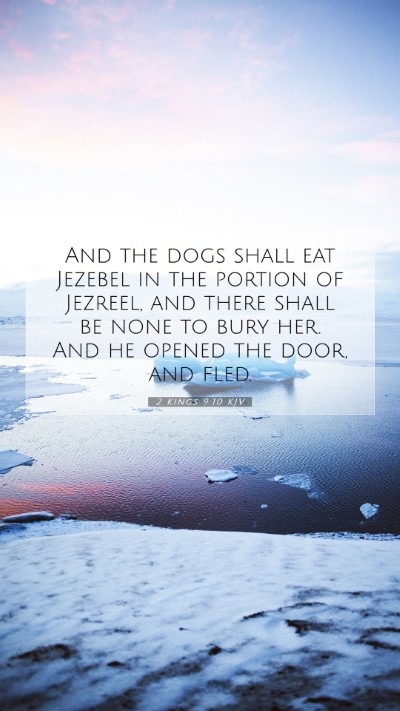Understanding 2 Kings 9:10
The verse 2 Kings 9:10 states: "And the dogs shall eat Jezebel in the portion of Jezreel, and there shall be none to bury her." This verse holds significant meaning in the context of divine judgment and the prophetic word regarding Jezebel, the infamous wife of King Ahab.
Bible Verse Commentary
The commentary from notable scholars provides a deeper insight into this passage.
Matthew Henry's Commentary
Henry emphasizes the certainty of God's judgment. He notes that the dogs eating Jezebel marks the violent and disgraceful end of her life, reflecting the culmination of her wicked actions and idolatry. It illustrates the judgment upon her for her persecutions against the prophets and her idolatrous practices that led Israel astray. The lack of a burial signifies utter disgrace, showcasing that her death would be dishonorable, a severance from the respect typically given to the dead.
Albert Barnes' Exposition
Barnes highlights the prophetic nature of this verse, pointing out that it exemplifies the fulfillment of God’s word concerning judgment. He reflects on how Jezebel’s life was marked by opposition to God’s prophets, and her demise reflects the moral order in which evil is ultimately punished. Barnes elaborates on the significance of her death taking place where her husband's actions had wreaked havoc in Israel, reinforcing a divine response to human sin.
Adam Clarke's Commentary
Clarke provides an analysis of the historical context surrounding Jezebel’s life. He notes that her actions led to significant injustices in Israel, like the murder of Naboth for his vineyard. Clarke mentions that the prophecy spoken serves as a narrative device, assuring readers that God’s justice prevails against evil, and that though Jezebel may have seemed powerful, her fate was sealed. The reference to dogs signifies complete humiliation and destruction.
Key Themes and Insights
- Divine Judgment: The verse communicates a strong message about the inevitability of divine retribution against wickedness.
- Disgrace of Evil: Jezebel’s lack of burial symbolizes the utmost disrespect and dishonor that accompanies a life devoted to sin.
- Prophetic Fulfillment: This scripture stands as a testament to God’s word being fulfilled through the prophet Elisha, highlighting the power of prophecy in scripture.
- Moral Order: It reinforces the theme of moral order in the scripture, where evil deeds ultimately face consequences.
Cross References
To further enrich your understanding of 2 Kings 9:10, here are some related Bible verses:
- 1 Kings 21:23: This verse foretells Jezebel's judgment and demise.
- 2 Kings 9:30-37: It describes the fulfillment of her death by dogs as prophesied.
- Revelation 2:20-23: This passage reflects on Jezebel as a symbol of false teaching and moral corruption.
Application and Reflection
Reflecting on 2 Kings 9:10 encourages believers to consider the profound consequences of turning away from God and engaging in sinful practices.
The verse can serve as a cautionary tale, urging individuals to pursue righteousness and to uphold the standards of justice depicted throughout Scripture.
Bible Study Insights
Engaging in Bible study groups when discussing passages such as 2 Kings 9:10 can provide valuable insights. Participants can explore the broader context of biblical justice, the significance of prophetic words, and the overall themes of redemption and punishment woven throughout the scriptures.
This verse invites in-depth analysis and discussion on various biblical themes, such as:
- Biblical exegesis on the nature of God’s justice.
- The historical context of Jezebel’s actions and their impact on Israel.
- Comparative analysis with other biblical characters who faced divine judgment.
Conclusion
In conclusion, 2 Kings 9:10 serves as a powerful reminder of God’s sovereignty and justice.
By studying this verse, believers can deepen their understanding of scripture interpretation and its applications in daily life, ensuring they live in alignment with God’s righteousness.
Whether through individual study or group discussions, the verse inspires meaningful contemplation on the serious consequences of one’s actions in relation to divine will.


